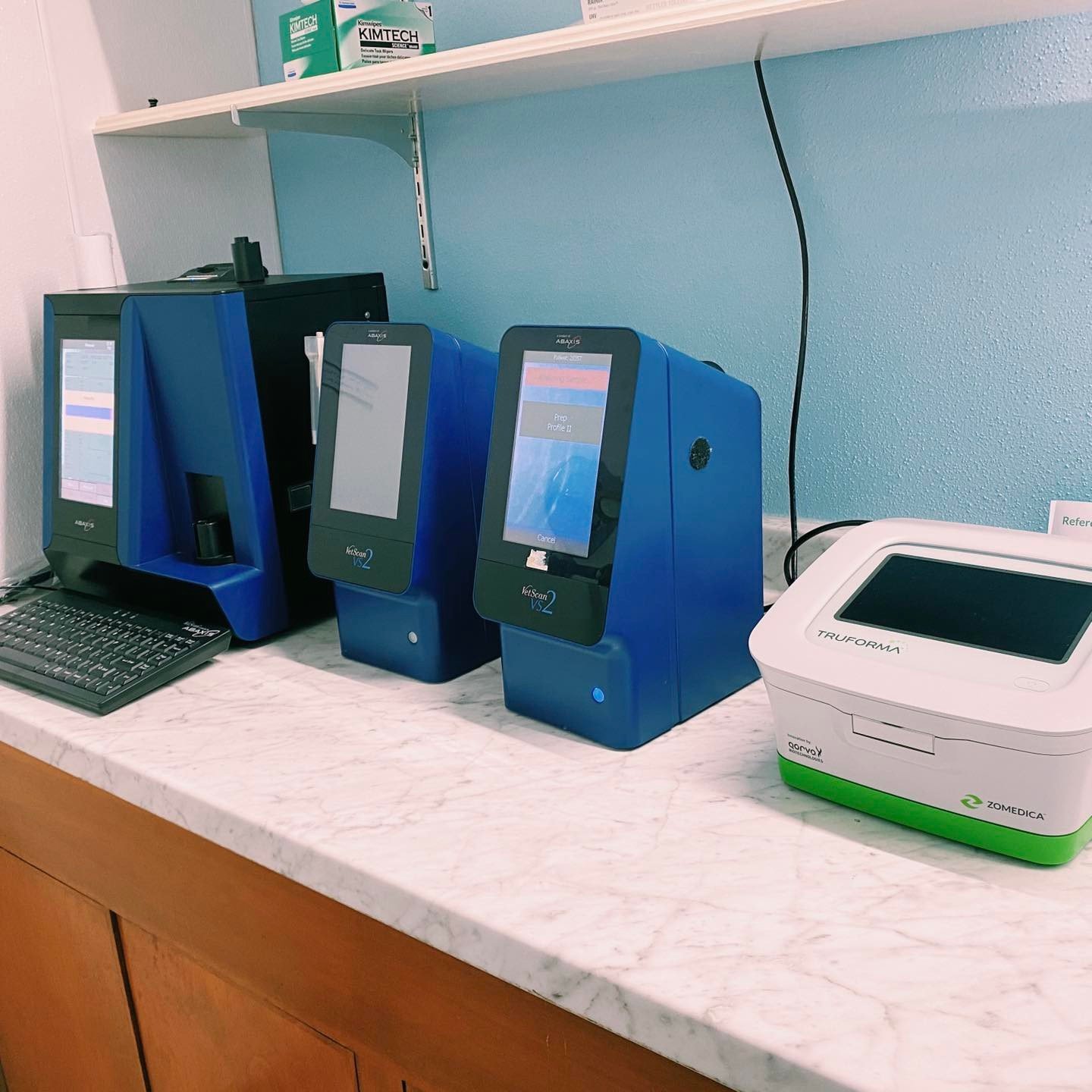Exciting changes are happening here at the Pet Vaccination Clinic! We have updated our lab and now offer bloodwork.
Blood testing is great for general health, ill patient, geriatric and wellness exams. In-office testing enables Dr. Leland to evaluate your pet‘s general health and can help us become aware of any health problems. The tests take 15-30 minutes to complete giving you the results during your appointment. For an estimate, call our office at (210) 923-5721.
We can perform:
Complete Blood Count (CBC) - Used to evaluate abnormal increases or decreases in cell counts that can indicate an underlying medical condition.
The CBC test measures several components and features of your blood, including:
Red blood cells, which carry oxygen
White blood cells, which fight infection
Hemoglobin, the oxygen-carrying protein in red blood cells
Hematocrit, the proportion of red blood cells to the fluid component, or plasma, in your blood
Platelets, which help with blood clotting
And more
Chemistry Analysis - Tests the liver, pancreas, kidney, and other internal values that can help determine the causes of sickness or disease.
The Comprehensive Test covers:
Alanine aminotransferase (ALT): This test may determine active liver damage, although it does not indicate the cause. Can indicate: Liver diseases, including viral hepatitis and cirrhosis; heart diseases.
Albumin (ALB): This is a serum protein that helps evaluate hydration, hemorrhage, and intestinal, liver, and kidney disease. Can indicate: Liver and kidney diseases.
Alkaline phosphatase (ALKP): Elevations in this test may indicate liver damage, Cushing's disease, or active bone growth in a young dog. Can indicate: Liver, bone, parathyroid, and intestinal diseases.
Amylase (AMYL): Elevations in this test indicate pancreatitis or kidney disease. Can indicate: Kidney and pancreatic disease.
Calcium (Ca): Changes in the normal level of this test can indicate a variety of diseases. Tumors, hyperparathyroidism, kidney disease, and low albumin are just a few of the conditions that alter serum calcium. Can Indicate: Parathyroid, bone, and chronic renal disease; tetany.
Creatinine (CREA): This test reveals kidney function and helps distinguish between kidney and non-kidney causes of elevated BUN. Can indicate: Renal disease.
Globulin (GLOB): This is a blood protein that often increases with chronic inflammation and certain disease states. Globulin concentration will increase with dehydration and should also increase with antigenic stimulation.
Glucose (GLU): Glucose is a blood sugar. Elevated levels may indicate diabetes mellitus. Low levels can cause collapse, seizures, or coma. Can indicate: Diabetes, hyperglycemia, hypoglycemia, diabetes, and liver disease.
Phosphorus (PHOS): Elevations in this test are often associated with kidney disease, hyperthyroidism, and bleeding disorders.: Kidney disease, hypoparathyroidism, and nutritional disorders.
Potassium (K): This is an electrolyte. Low levels may lead to symptoms such as vomiting, diarrhea, or excessive urination. Increased levels may indicate kidney failure, Addison's disease, dehydration or urethral obstruction. High levels can lead to cardiac arrest.: Malnutrition and renal disease. This electrolyte is used to diagnose the causes of vomiting, diarrhea, and cardiac symptoms.
Sodium (Na): Sodium is an electrolyte. Low levels may lead to vomiting, diarrhea, kidney disease, and Addison's disease. This test helps indicate hydration status: Dehydration, and diabetes. This electrolyte is used to diagnose the causes of vomiting, diarrhea, and cardiac symptoms.
Total bilirubin (TBIL): Elevations in this test may indicate liver or hemolytic disease. This test helps identify bile duct problems and certain types of anemia. Can indicate: Hepatic disorders.
Total protein: This test indicates hydration status and provides additional information about the liver, kidneys, and infectious diseases. Can indicate: Dehydration, kidney, liver disease, and metabolic and nutritional disorders.
Blood Urea Nitrogen (BUN): This test determines kidney function. An increased level is called azotemia and can be caused by kidney, liver, and heart disease as well as urethral obstruction, shock, or dehydration. Can indicate: Liver and kidney diseases.
Thyroid levels - Tests the thyroid-stimulating hormone levels in dogs and cats that are needed for the diagnosis of thyroid disease.
We’ll be sharing more about our updated lab and the things we can do to further track and examine the health of your pet. For more frequent updates, follow us on Instagram!











